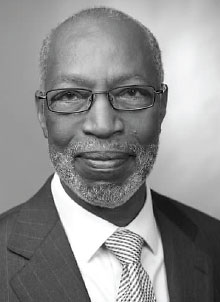Expert Evaluation, Social History Key in Capital Defense Litigation
Abstract
Supreme Court decisions have established that in capital litigation, defense teams must develop a full social history based on information gathered from the defendant, family members, and others with intimate knowledge of the defendant.
Education of jurors about a defendant’s history of trauma, abuse, and/or exposure to casual violence can be critical when a defendant is on trial for his or her life.

“So much of the overdetermined finding of antisocial personality disorder is based on the fact that the guy allegedly did something bad.” —Richard Dudley, M.D.
“This is relevant to psychiatrists because the psychiatric expert is the vehicle by which that education occurs,” said forensic psychiatrist Richard Dudley, M.D. “There are situations in which it is crucial to get a jury to understand that the childhood trauma a defendant experienced is not the average experience of an average Black person, and you go into the trial knowing you have to have a discussion about race and racial biases.”
In a 2008 article in Hofstra Law Review, “Getting It Right: Life History Investigation as the Foundation for a Reliable Mental Health Assessment,” Dudley and Pamela Blume Leonard wrote that successive Supreme Court decisions—Williams v. Taylor (2000), Wiggins v. Smith (2003), and Rompilla v. Beard (2005)—have established that defense counsel in capital litigation are required to perform a thorough review of social history and possible mitigating circumstances.
But Dudley—who has testified in capital cases and reviewed dozens of trial-level mental health evaluation reports and testimony (including post-conviction mental health examinations of defendants)—said that it doesn’t always happen.
To the extent that the history is uncovered, it may be regarded by juries that are largely White as standard experience for Black people—rather than a severely disabling, out-of-the-ordinary experience that may have shaped the defendant’s behavior, Dudley said.
In an interview with Psychiatric News, he said the trauma history of Black defendants may never be uncovered at the trial level, either because the defendant is not asked about trauma or because the evaluator fails to develop the type of working relationship with the defendant that would put the defendant more at ease to talk about early traumatic experiences.
“More often than not, people of color who are facing the death penalty and being evaluated by mental health professionals have no history with a mental health professional, and the whole process of engaging them in some collaborative way about the trauma they experienced is a totally new experience,” Dudley said. “The attempt to be extremely objective as an evaluator may undercut [the creation of] an environment in which defendants can get engaged in a process they have never engaged with before and reveal childhood secrets they have never talked about with anyone.”
Dudley emphasized that in the absence of a thorough mental health and social history review, Black defendants are disproportionately labeled as having antisocial personality disorder, which, he said, is sometimes used as a “catch-all” diagnosis for people “who do bad things,” one that can bias a jury toward death.
But many of the apparent symptoms of antisocial personality disorder—lack of remorse, irritability, and impulsiveness—may be better understood as stemming from bipolar disorder, borderline personality disorder, or other conditions. Meanwhile, there may often be no evidence of other core required symptoms of antisocial personality disorder, such as history of childhood conduct disorder, Dudley said.
“So much of the overdetermined finding of antisocial personality disorder is based on the fact that the guy allegedly did something bad,” Dudley said. “A lack of remorse may stem from a lot of things—in young people, it’s often a defense against their feelings of being anxious and afraid, so they act like ‘I don’t care about any of this.’ The same is true of irritability and impulsiveness, which could be a manifestation of mood instability or other aspects of the trauma response.”
And trauma is often multi-generational. “In my experience, people who have these severe histories of childhood trauma also lack the type of parenting that might have mitigated the trauma,” Dudley said. “The parents had the same experience and are unable to protect and help their own kids….In the face of repeated exposure to childhood trauma, this exacerbates the trauma response and results in other developmental difficulties.”
But without a full social history, Dudley said, “when the symptoms are coupled with the idea that the defendant did this bad act, it gets read as antisocial personality disorder.” ■
“Getting It Right: Life History Investigation as the Foundation for a Reliable Mental Health Assessment” is posted here.



